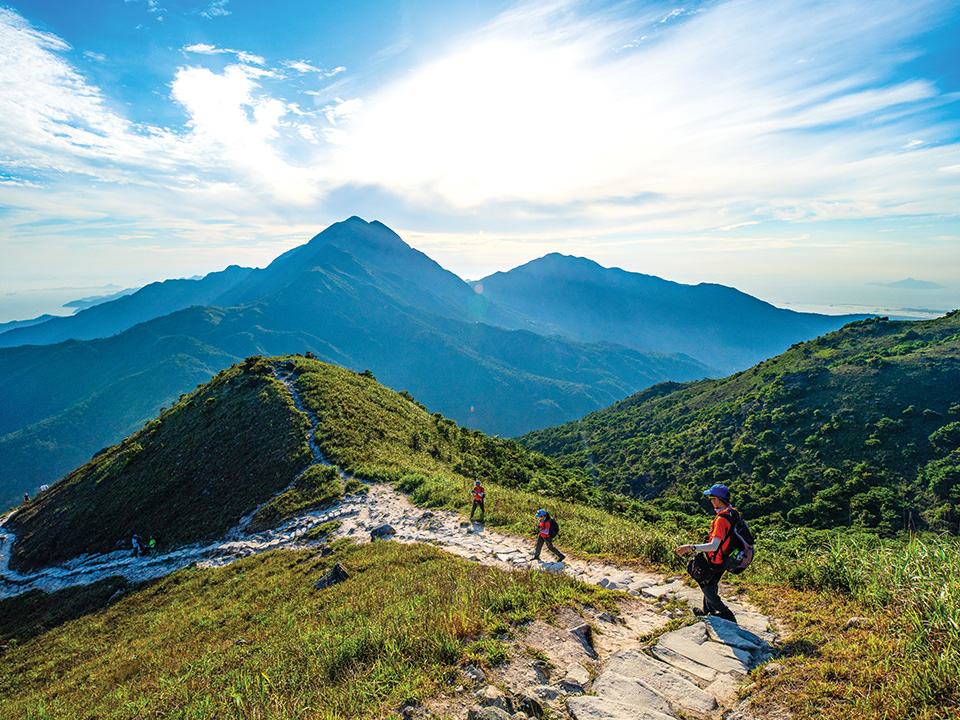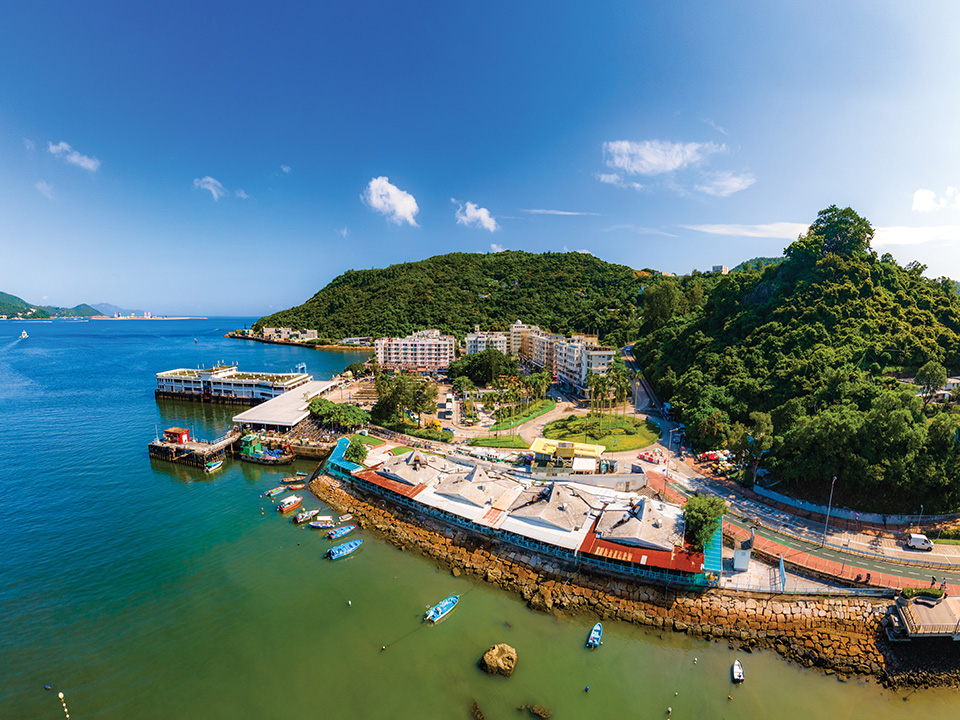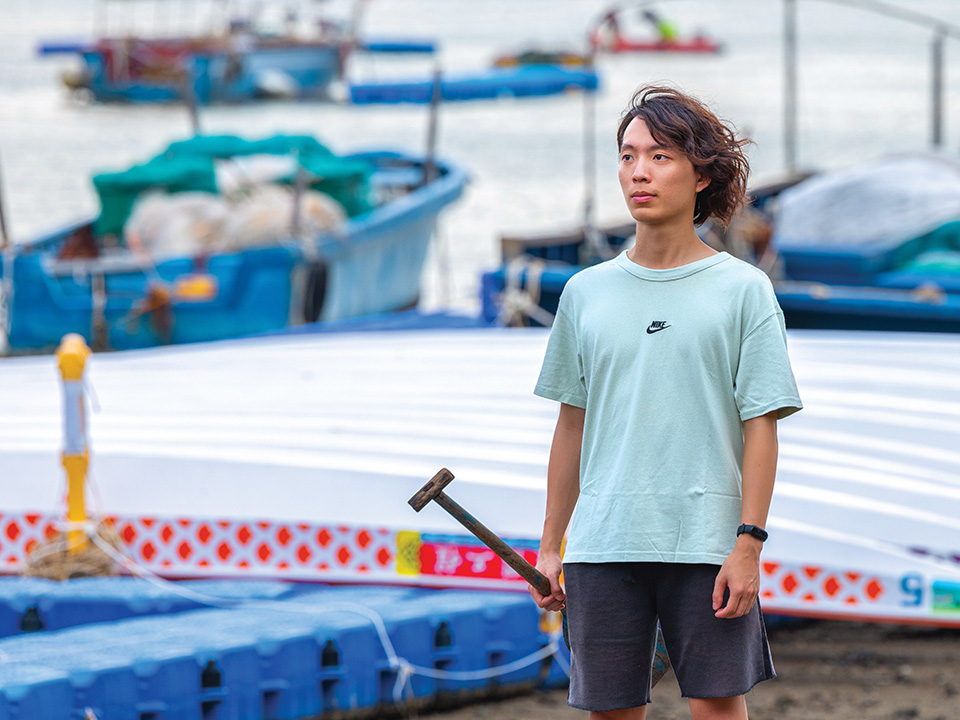About Sunset Peak
Lantau Island, which lies to the west of Hong Kong Island, is dominated by two enormous mountains — the 934-metre-high Lantau Peak and 869-metre Sunset Peak, which are respectively the city’s second and third highest peaks. The latter offers incredible views of the ocean, islands and beaches, as well as beguiling silvergrass that grows on its slopes. A hike up this peak will also take you to the stone huts of a mysterious mountaintop settlement.
Pak Kung Au is a mountain pass that runs along Tung Chung Road, which passes through the two tall peaks and connects the north and south sides of Lantau Island. The Chinese name is carved into the side of the road. After your bus ride up the steep valley from Tung Chung, now it’s time for your legs to take over. Take the steps to the east, onto the well-signposted Lantau Trail, and your hike begins.
After a pleasantly shaded climb through a forest, the trail emerges onto an open grassy hillside. Suddenly you have vistas of Lantau Peak and the white sands of the island’s south coast. Below on your right, Cheung Sha — Hong Kong’s longest beach — stretches out for three kilometres. Out to sea, high-speed ferries between Hong Kong and Macau can be seen passing between Lantau and the faraway Soko Islands, the waters of which were declared Hong Kong’s third marine park in 2022. The Lantau Trail skirts the actual summit of Sunset Peak, but you can make a brief detour off the trail to set foot on this mountain’s highest point.
The grassy plateau beyond Sunset Peak hosts 19 mysterious stone chalets. They belong to the Lantau Mountain Camp, which was built in the 1920s as holiday accommodation for missionaries. Food and water had to be carried up the hill all the way from Mui Wo. The huts are still in occasional use. Climb up a rock past the first hut on your right to get an expansive view of the whole upland. Hidden on the hillside below, there’s a rainwater-filled pool built by the missionaries so they could go swimming during the hot summers.
You can enjoy views of far-off Pui O Beach and the South China Sea while hiking towards Yi Tung Shan, a secondary summit at the far end of the plateau. As you walk, you’ll find yourself immersed in the gentle rustling of the sea of silvergrass, which can grow as tall as a person. The golden hue of the grass in the late afternoon sunlight creates a romantic backdrop. The trail then enters thick forest again as you descend all the way to the picnic area at Nam Shan.
An ancient village trail of beautifully hewn stone steps leads through cool, dark jungle to Luk Tei Tong, where there’s a tall stone watchtower with fortress-like barred window slits. Listed as a Grade 3 heritage building, it was built in the early 1940s to protect the village farmers from pirates and bandits. It was converted to residential use in the 1950s but it’s vacant today. The path continues between village houses and riverbanks to finish at Mui Wo’s waterfront.
The lively little town of Mui Wo stretches from the curve of Silver Mine Bay Beach along a promenade to the ferry pier. This is where many choose to start or end their Lantau hikes. Mui Wo has more than a dozen restaurants serving a range of cuisines, from Chinese and Western to Thai, Nepalese and Turkish. There’s also a cooked food centre, which is popular for its seafood offerings, near the ferry pier.

Pak Kung Au is a mountain pass that runs along Tung Chung Road, which passes through the two tall peaks and connects the north and south sides of Lantau Island. The Chinese name is carved into the side of the road. After your bus ride up the steep valley from Tung Chung, now it’s time for your legs to take over. Take the steps to the east, onto the well-signposted Lantau Trail, and your hike begins.

After a pleasantly shaded climb through a forest, the trail emerges onto an open grassy hillside. Suddenly you have vistas of Lantau Peak and the white sands of the island’s south coast. Below on your right, Cheung Sha — Hong Kong’s longest beach — stretches out for three kilometres. Out to sea, high-speed ferries between Hong Kong and Macau can be seen passing between Lantau and the faraway Soko Islands, the waters of which were declared Hong Kong’s third marine park in 2022. The Lantau Trail skirts the actual summit of Sunset Peak, but you can make a brief detour off the trail to set foot on this mountain’s highest point.

The grassy plateau beyond Sunset Peak hosts 19 mysterious stone chalets. They belong to the Lantau Mountain Camp, which was built in the 1920s as holiday accommodation for missionaries. Food and water had to be carried up the hill all the way from Mui Wo. The huts are still in occasional use. Climb up a rock past the first hut on your right to get an expansive view of the whole upland. Hidden on the hillside below, there’s a rainwater-filled pool built by the missionaries so they could go swimming during the hot summers.

You can enjoy views of far-off Pui O Beach and the South China Sea while hiking towards Yi Tung Shan, a secondary summit at the far end of the plateau. As you walk, you’ll find yourself immersed in the gentle rustling of the sea of silvergrass, which can grow as tall as a person. The golden hue of the grass in the late afternoon sunlight creates a romantic backdrop. The trail then enters thick forest again as you descend all the way to the picnic area at Nam Shan.

An ancient village trail of beautifully hewn stone steps leads through cool, dark jungle to Luk Tei Tong, where there’s a tall stone watchtower with fortress-like barred window slits. Listed as a Grade 3 heritage building, it was built in the early 1940s to protect the village farmers from pirates and bandits. It was converted to residential use in the 1950s but it’s vacant today. The path continues between village houses and riverbanks to finish at Mui Wo’s waterfront.

The lively little town of Mui Wo stretches from the curve of Silver Mine Bay Beach along a promenade to the ferry pier. This is where many choose to start or end their Lantau hikes. Mui Wo has more than a dozen restaurants serving a range of cuisines, from Chinese and Western to Thai, Nepalese and Turkish. There’s also a cooked food centre, which is popular for its seafood offerings, near the ferry pier.




























